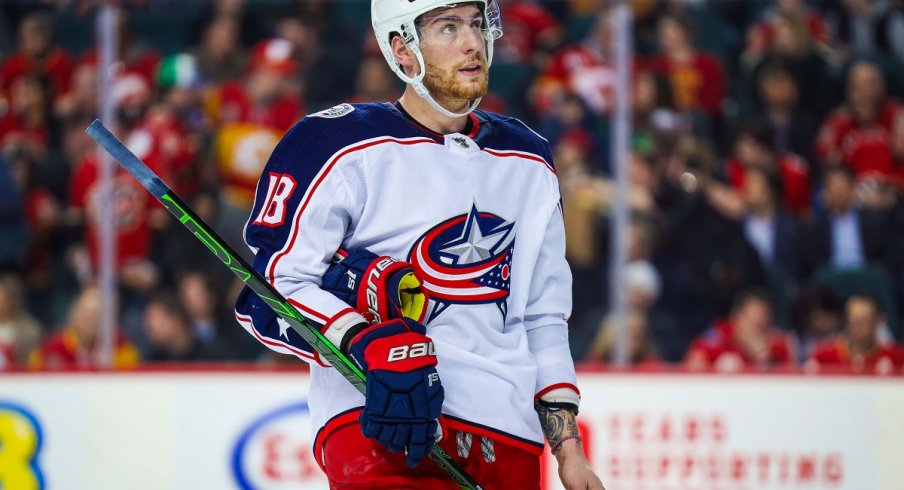Per reports, Pierre-Luc Dubois has requested a trade from the Columbus Blue Jackets.
Pierre-Luc Dubois is not in Columbus as camp approaches and remains unsigned. And now there are rumblings from a few teams around the league that Dubois may be looking for a change of scenery. Maybe wishful thinking on their part. But stay tuned on this one.
— Pierre LeBrun (@PierreVLeBrun) December 31, 2020
Dubois, who signed a two-year, $10M contract on New Year's Eve, will still be an RFA after his current contract expires, meaning the Blue Jackets don't have to make a trade as he'll be under team control. To Dubois' credit, he's well within his rights to request a trade. And further to his credit, he said (mostly) all the right things during his media availability on Sunday.
#CBJ Pierre-Luc Dubois on the potential of his desire for a change of scenery becoming a distraction: pic.twitter.com/aywSXwZYGf
— Aaron Portzline (@Aportzline) January 3, 2021
Player's requesting trades isn't a Columbus-specific problem. Hell, Max Domi is in Columbus because he became unhappy with his diminishing role in Montreal. On the other hand, this trend (and it is a trend) of key players publicly wanting out of Columbus is becoming untenable.
The Athletic's Aaron Portzline summarized the situation nicely:
If Dubois’ feelings don’t change, he’ll become just the latest young, promising player whose relationship with the club has run aground when it’s time to sign a contract beyond his entry-level deal.
While Artemi Panarin and Sergei Bobrovsky easily come to mind when it comes to players wanting out of Columbus, the list is longer than we care to mention.
It predates this regime, to be fair, but it's not hard for long-time Blue Jackets fans to recall Rick Nash's trade request in 2012. In 2016, budding star center Ryan Johansen was traded after it became obvious that the two sides would be unable to mend bridges from a contract dispute.
Zach Werenski is (mercifully) still on the roster, though his contract negotiations a year ago were amicable but nearly bled into training camp. And even more recently, Josh Anderson was traded after the two sides agreed to disagree on a contract that would have kept him in Columbus.
Who can say the root cause of this problem? Is the city of Columbus, which has similar demographics to other midwestern cities (and successful NHL franchises) like St. Louis and Pittsburgh, such a drag that players look to the bright lights of Sunrise, Florida?
Does John Tortorella, who has changed the culture of the organization from an afterthought to a perennial playoff team (the Blue Jackets are one of the just six teams with at least four consecutive playoff appearances), wear down his top players with such regularity that they prefer to play elsewhere? Does GM Jarmo Kekalainen, who correctly has the reputation of an elite talent evaluator, rely on his negotiating "hammer" so much that it strains the relationship with his current players? Is it something else? A combination of these? Or are we missing the boat entirely, and it just happens to be a (un)lucky coincidence that top players make it known that they'd rather play elsewhere, in this case, years before UFA years are even on the horizon?
Tortorella, in his media availability, said that the organization would follow a similar blueprint to two seasons ago, where Panarin and Bobrovsky were lame duck superstars for an entire season before leaving via free agency.
“This is the world we live in. We’re transparent about everything," Tortorella said Sunday. "It’s important that it belongs in the room where everybody’s involved with it and understanding of what’s going on. This situation… I’m not sure, I have not spoken to (Dubois) or anything like that. But we’ll talk about it as men and we’ll talk about it in a group setting. This isn’t new for us, especially the last couple years. We’ve had some interesting years. We’re not going to overthink it. We’re going to have a conversation, and everybody is going to understand where everybody stands. We’re going to get about our business and get ready to play.”
“It’s a little different athlete nowadays coming into the league, sometimes thinking they have more answers than they do, and they aren’t willing to go through the process. That’s where the conflict comes in, but conflict isn’t a bad thing. If there’s conflict, there’s honesty."
I agree with Tortorella – the athlete today probably is built a little bit differently than in prior generations. And while other NHL teams are far from exempt from similar controversies, it seems that Columbus is slower to adapt than its counterparts. After all, what is the benefit of drafting and developing well if the front office/coaching staff can't foster relationships/loyalty with these very players?
At the end of the day, Tortorella and Kekalainen are largely responsible for changing the culture in Columbus. But, as Dubois' words and actions have evidenced, there's still a long way to go.
